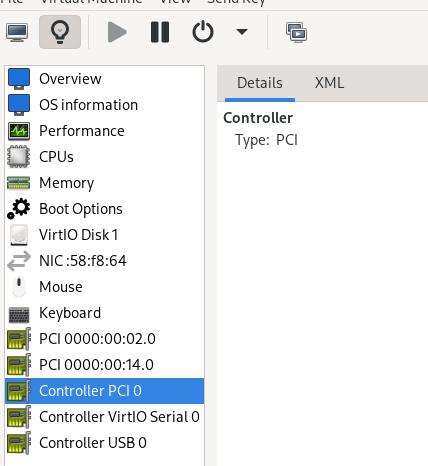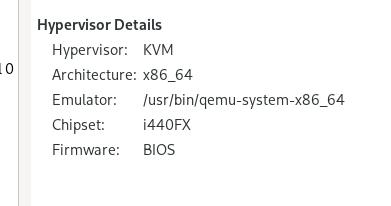vtdlibvirtconfiguration
Feb 24, 2023
Technology
Steps
Install kde desktop environment:
$ sudo apt install -y kubuntu-desktop
Install libvirtd and remove default qemu, then install compiled qemu:
$ sudo apt install -y libvirt-bin
$ sudo apt remove qemu-system-x86
// Go to qemu source code:
# make install
# qemu-system-x86_64 --version
QEMU emulator version 4.2.0 (v4.2.0-dirty)
Copyright (c) 2003-2019 Fabrice Bellard and the QEMU Project developers
Install virt-manager for managing the vms:
$ sudo apt install -y virt-manager
$ sudo systemctl enable libvirtd
$ sudo systemctl start libvirtd
Install win10 using following configurations:

vm configuration:

Added the qemuargs:
virt-xml win10 --edit --confirm --qemu-commandline '-set device.hostpci0.x-igd-gms=1'
libvirt configuration
libvirt hooks for pre-set vfio and post release vfio equipments:
root@idv10:/etc/libvirt/hooks# cat qemu
#!/bin/bash
OBJECT="$1"
OPERATION="$2"
if [[ $OBJECT == "win10" ]]; then
case "$OPERATION" in
"prepare")
systemctl start libvirt-nosleep@"$OBJECT" 2>&1 | tee -a /var/log/libvirt/custom_hooks.log
/bin/vfio-startup.sh 2>&1 | tee -a /var/log/libvirt/custom_hooks.log
;;
"release")
systemctl stop libvirt-nosleep@"$OBJECT" 2>&1 | tee -a /var/log/libvirt/custom_hooks.log
/bin/vfio-teardown.sh 2>&1 | tee -a /var/log/libvirt/custom_hooks.log
;;
esac
fi
root@idv10:/etc/libvirt/hooks# cat vfio-startup.sh
#!/bin/bash
# Helpful to read output when debugging
set -x
long_delay=10
medium_delay=5
short_delay=1
echo "Beginning of startup!"
function stop_display_manager_if_running {
# Stop dm using systemd
if command -v systemctl; then
if systemctl is-active --quiet "$1.service" ; then
echo $1 >> /tmp/vfio-store-display-manager
systemctl stop "$1.service"
fi
while systemctl is-active --quiet "$1.service" ; do
sleep "${medium_delay}"
done
return
fi
# Stop dm using runit
if command -v sv; then
if sv status $1 ; then
echo $1 >> /tmp/vfio-store-display-manager
sv stop $1
fi
fi
}
# Stop currently running display manager
if test -e "/tmp/vfio-store-display-manager" ; then
rm -f /tmp/vfio-store-display-manager
fi
stop_display_manager_if_running sddm
stop_display_manager_if_running gdm
stop_display_manager_if_running lightdm
stop_display_manager_if_running lxdm
stop_display_manager_if_running xdm
stop_display_manager_if_running mdm
stop_display_manager_if_running display-manager
sleep "${medium_delay}"
# Unbind VTconsoles if currently bound (adapted from https://www.kernel.org/doc/Documentation/fb/fbcon.txt)
if test -e "/tmp/vfio-bound-consoles" ; then
rm -f /tmp/vfio-bound-consoles
fi
for (( i = 0; i < 16; i++))
do
if test -x /sys/class/vtconsole/vtcon${i}; then
if [ `cat /sys/class/vtconsole/vtcon${i}/name | grep -c "frame buffer"` \
= 1 ]; then
echo 0 > /sys/class/vtconsole/vtcon${i}/bind
echo "Unbinding console ${i}"
echo $i >> /tmp/vfio-bound-consoles
fi
fi
done
# Unbind EFI-Framebuffer
if test -e "/tmp/vfio-is-nvidia" ; then
rm -f /tmp/vfio-is-nvidia
fi
if lsmod | grep "nvidia" &> /dev/null ; then
echo "true" >> /tmp/vfio-is-nvidia
echo efi-framebuffer.0 > /sys/bus/platform/drivers/efi-framebuffer/unbind
fi
igd_id="8086 $(lspci -n|grep '0:02.0'|cut -d ':' -f4|cut -c 1-4)"
usb_id="8086 $(lspci -n|grep '00:14.0'|cut -d ':' -f4|cut -c 1-4)"
echo 0000:00:02.0 > /sys/bus/pci/drivers/i915/unbind
echo 0000:00:14.0 > /sys/bus/pci/drivers/xhci_hcd/unbind
if ! lsmod | grep "vfio_pci" &> /dev/null ; then
modprobe vfio-pci
fi
echo $igd_id > /sys/bus/pci/drivers/vfio-pci/new_id
echo $usb_id > /sys/bus/pci/drivers/vfio-pci/new_id
echo "End of startup!"
root@idv10:/etc/libvirt/hooks# cat vfio-teardown.sh
#!/bin/bash
set -x
# on shutoff state then you could unbind the vfio-pcis
#sleep 20
#a="fucku"
#until [[ $a == "shut off" ]]
#do
# a=`virsh domstate win10`
# sleep 3
#done
ia_addr="0000:$(lspci|grep 'Audio'|grep 'Intel'|cut -c 1-7)"
usb_addr="0000:$(lspci|grep 'USB'|grep 'Intel'|cut -c 1-7)"
igd_id="8086 $(lspci -n|grep '0:02.0'|cut -d ':' -f4|cut -c 1-4)"
echo 0000:00:02.0 > /sys/bus/pci/drivers/vfio-pci/unbind
echo $ia_addr > /sys/bus/pci/drivers/vfio-pci/unbind
echo $usb_addr > /sys/bus/pci/drivers/vfio-pci/unbind
echo $igd_id > /sys/bus/pci/drivers/vfio-pci/remove_id
echo 0000:00:02.0 > /sys/bus/pci/drivers/i915/bind
echo $ia_addr > /sys/bus/pci/drivers/snd_hda_intel/bind
echo $usb_addr >/sys/bus/pci/drivers/xhci_hcd/bind
echo "Beginning of teardown!"
sleep 10
# Restart Display Manager
input="/tmp/vfio-store-display-manager"
while read displayManager; do
if command -v systemctl; then
systemctl start "$displayManager.service"
else
if command -v sv; then
sv start $displayManager
fi
fi
done < "$input"
# Rebind VT consoles (adapted from https://www.kernel.org/doc/Documentation/fb/fbcon.txt)
input="/tmp/vfio-bound-consoles"
while read consoleNumber; do
if test -x /sys/class/vtconsole/vtcon${consoleNumber}; then
if [ `cat /sys/class/vtconsole/vtcon${consoleNumber}/name | grep -c "frame buffer"` \
= 1 ]; then
echo "Rebinding console ${consoleNumber}"
echo 1 > /sys/class/vtconsole/vtcon${consoleNumber}/bind
fi
fi
done < "$input"
# Rebind framebuffer for nvidia
if test -e "/tmp/vfio-is-nvidia" ; then
echo "efi-framebuffer.0" > /sys/bus/platform/drivers/efi-framebuffer/bind
fi
echo "End of teardown!"
kde reback
kde startup command in desktop, vm exit will send back to desktop.
fix
some fixes:
root@h3c:/etc/libvirt/hooks# chmod 777 *.sh
root@h3c:/etc/libvirt/hooks# chmod 777 *
root@h3c:/etc/libvirt/hooks# ln -s /etc/libvirt/hooks/vfio-startup.sh /bin/
root@h3c:/etc/libvirt/hooks# ln -s /etc/libvirt/hooks/vfio-teardown.sh /bin/
root@h3c:/etc/libvirt/hooks# ls -l -h /bin/vfio-*
lrwxrwxrwx 1 root root 34 Feb 28 23:05 /bin/vfio-startup.sh -> /etc/libvirt/hooks/vfio-startup.sh
lrwxrwxrwx 1 root root 35 Feb 28 23:05 /bin/vfio-teardown.sh -> /etc/libvirt/hooks/vfio-teardown.sh
Add some systemd files:
root@h3c:/etc/libvirt/hooks# cat /etc/systemd/system/libvirt-nosleep\@.service
[Unit]
Description=Preventing sleep while libvirt domain "%i" is running
[Service]
Type=simple
ExecStart=/usr/bin/systemd-inhibit --what=sleep --why="Libvirt domain \"%i\" is running" --who=%U --mode=block sleep infinity
